In a reflection of the current state of pop, in which hip-hop and urban music are the dominating forces, artists such as Jay-Z, Kendrick Lamar, Childish Gambino and Bruno Mars are among the top nominees the 60th Grammy Awards, to be held Jan. 28 from Madison Square Garden in New York.
- Grammys get in tune with hip-hop and diversity for 2018 nominations
- Grammys 2018: Complete list of nominees
- Grammy snubs: Ed Sheeran and Post Malone largely left out in the cold
- Kesha finally gets her first Grammy nomination
- Meet Taylor Swift, behind-the-scenes songwriter
- ‘Despacito,’ the year’s runaway hit sung in Spanish, could make Grammy history
- Grammy nods for women, people of color an encouraging sign the Recording Academy is paying attention
How the Recording Academy has evolved toward relevance with the 2018 Grammy nominations
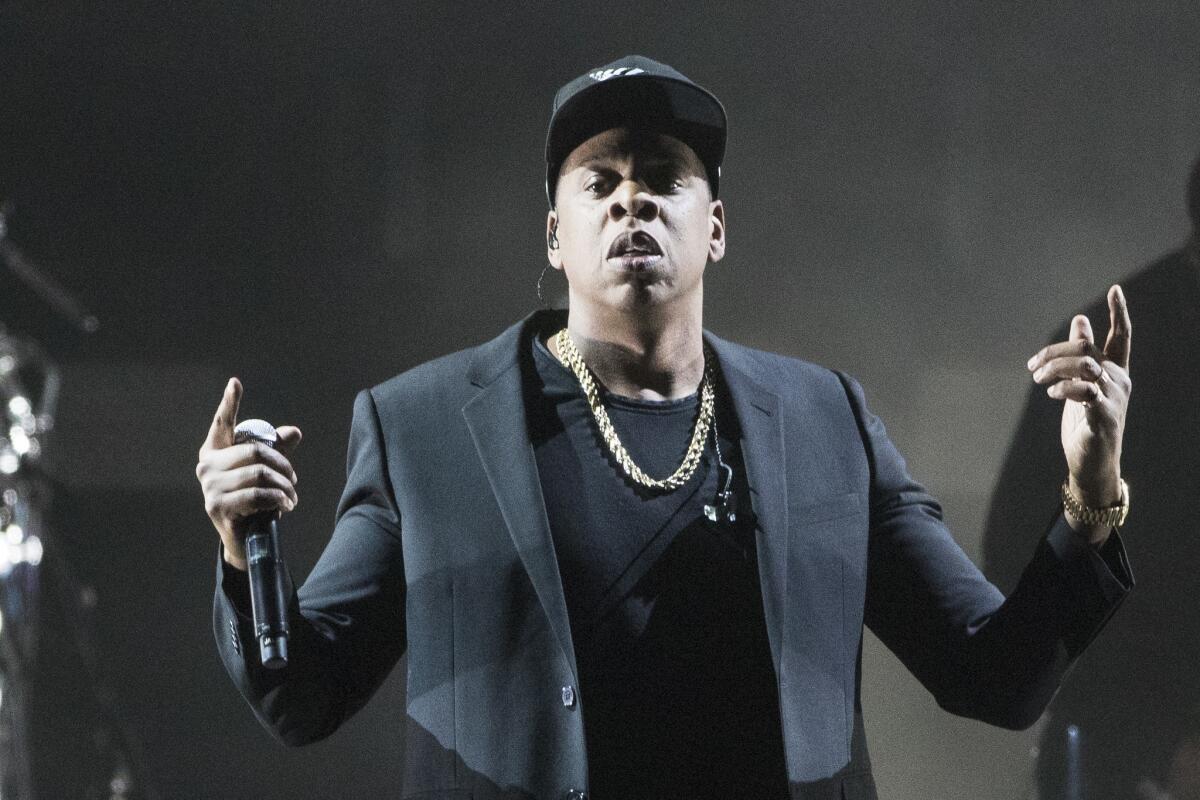
What a difference a decade makes.
Ten years ago at the 50th Grammy Awards, Kanye West was the only hip-hop artist in the race for album of the year, pitted against English indie-rock chanteuse Amy Winehouse, perennially nominated rock band the Foo Fighters, country singer-songwriter Vince Gill and jazz veteran Herbie Hancock; Hancock won.
The 60th Grammy Awards will be a very different scene.
After treading cautiously through the realm of hip-hop urban music for nearly four decades, the academy has embraced the genre wholeheartedly.
For the first time in that six-decade history, there was not a white male among the album-of-the-year nominees (Lorde is the sole female), while the record and song-of-the-year nominations included the first Spanish-language song — “Despacito” by Puerto Rican musicians Fonsi and Daddy Yankee — to be recognized in four marquee categories.
‘Despacito’ is on the verge of Grammy history
The Grammys have the strongest contender for a non-English-language winner for song of the year (and record of the year) since Dwight D. Eisenhower was president.
That song, of course, is “Despacito,” the consensus pick for “song of the summer” 2017. The tune — performed by Puerto Rican singer Luis Fonsi and rapper Daddy Yankee, with a remix guest-verse boost from Justin Bieber — spent 34 weeks on the Hot 100 and tied for the longest stint atop that chart ever at 16 weeks.
“I believe that we are in a global world right now, and it’s amazing that the U.S. opened its doors, its ears and its heart for a song mainly in Spanish,” said Erika Ender, the Panamanian songwriter who wrote “Despacito” with Fonsi, Yankee, Bieber, Jason “Poo Bear” Boyd and Marty James Garton.
I also believe that it has to do with the universal language of music. It’s a confirmation that it doesn’t matter the language, what matters is the energy, the way something makes you feel, how it moves you.
— Erika Ender
Alison Krauss could break long-standing tie with Quincy Jones for second-most Grammy Awards
Much of the focus on this year’s Grammy Award nominations is on the strong showing for hip-hop and urban music, and by artists of color and women who have received most of the top nominations over long-standing Recording Academy favorites.
Country and bluegrass musician Alison Krauss squarely registers in the latter category, yet she wasn’t overlooked this year for her recent album “Windy City.” It earned her two nominations: country solo performance for the track “Losing You,” and American roots performance for “I Never Cared For You.”
Significantly for longtime Grammy Awards watchers, it creates the possibility that she can break the tie she’s been in for years with esteemed producer, songwriter and musician Quincy Jones.
Each has collected 27 Grammys, second only to longtime Chicago Symphony conductor Sir Georg Solti, whose 31 Grammys have long represented a Mt. Everest in the music industry.
Krauss tied Jones with her win in 2011 for her album “Paper Airplane,” which took home the bluegrass album award. Jones’ most recent Grammy came in 1996 with a spoken word award for the audiobook for “Q — The Autobiography of Quincy Jones.”
As things stand, Krauss is the most-awarded woman in Grammy history. She may be a longshot in the American roots category — she’s nominated with two artists likely to be sentimental favorites because they died recently: Leonard Cohen and Glen Campbell.
In the country solo performance category, Krauss is nominated alongside Sam Hunt, Miranda Lambert, Maren Morris and Chris Stapleton.
The Grammy Awards will be announced on Jan. 28.
Shane McAnally worked on ‘Body Like a Back Road’ and ‘Drinkin’ Problem,’ and now he’s competing against himself
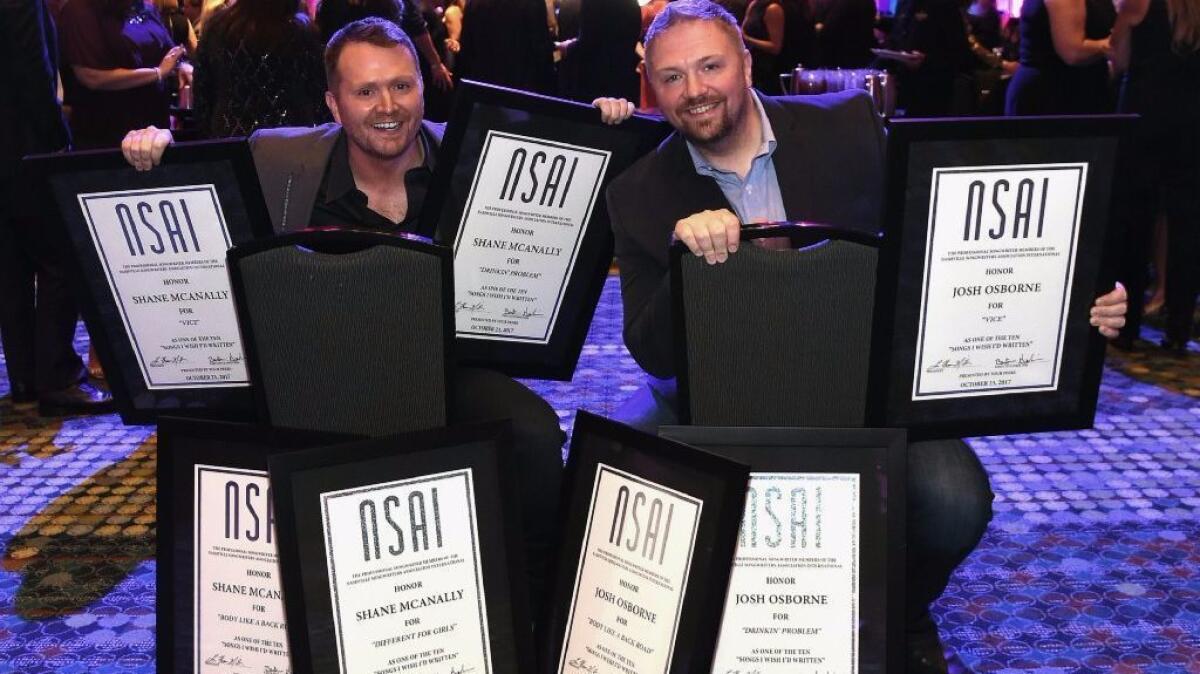
Shane McAnally had forgotten that the nominations for the 60th Grammy awards would be announced Tuesday morning. So when a friend called to congratulate him, he had to ask “What for?”
The Texas native netted two nominations in the category of country song for tunes that both hit No. 1 this year. The first, Sam Hunt’s “Body Like a Back Road”— co-written with Hunt, Josh Osborne and Zach Crowell — broke the record for the longest streak at No. 1 on the Hot Country Songs chart.
The second, Midland’s “Drinkin’ Problem”— co-written by McAnally, Osborne and band members Jess Carson, Cameron Duddy and Mark Wystrach — proved to be a breakthrough for the trio.
The songs could not be more different. “Body Like a Back Road” is slinky, hip-hop influenced pop country while “Drinkin’ Problem” is a Strait-up throwback to the traditionalist hat acts of the ’80s and ’90s.
“Everybody that is in modern country music [complains] about ‘Drinkin’ Problem’ and everybody in conservative country music [complains] about ‘Body Like a Back Road,’” he says of the pop versus traditional divide in Nashville.
“That’s literally like a Democrat and a Republican running for something.”
Depending on whom you ask, the songwriter-producer is either a savior lauded for work with artists like Kacey Musgraves and Midland or a devil vilified for collaborations with artists like Hunt and Thomas Rhett. He says, with another laugh, “Maybe I’m both!”
When asked if he has ever met anyone who loves both songs, McAnally says, “Well, I feel like somebody must like both of them, maybe they’re not admitting it. Apparently, the Grammys like both of them.”
Since both nominations are in the same category, McAnally and Osborne only have a shot at one trophy. But, he says, “I have competed against myself before and the last time this happened, I won, so maybe this is a good sign.”
In 2014 McAnally, Osborne and Musgraves won country song for her hit “Merry Go ’Round,” beating out himself, Musgraves and Brandy Clark for writing Miranda Lambert’s “Mama’s Broken Heart.”
McAnally, who also has a songwriting hand in three of the works nominated for country album, is proud of his early association with both acts. He says the styles reflect different parts of his own musical heart.
He is aware, however, that “‘Body Like a Back Road’ has eclipsed everything I have ever done commercially. I hope I do, clearly, but I would be surprised if I ever had a song I’m more known for than that. It’s a career record for me.”
Wait, didn’t Garbage bring white men to the Grammys?
In the internet’s excitement early Tuesday over the remarkable lack of white men among the Grammy nominees for album of the year — and to be clear, this is definitely very exciting! — a bit of untruth began circulating online that said this was the first time this has happened since 1999.
That’s the year Lauryn Hill won album of the year for her landmark solo debut, “The Miseducation of Lauryn Hill,” beating out similarly excellent records by Madonna, Shania Twain, Sheryl Crow and Garbage.
Certainly that was a great year for women, including Garbage’s singer, Shirley Manson.
But as this vintage publicity photo demonstrates — we found it in the L.A. Times’ archives — Garbage was not Manson’s solo project.
It was a band.
What’s worse, Manson’s bandmates were three white men: Butch Vig, Duke Erikson and Steve Marker. (In fact, they still are: After drifting apart in 2005, the musicians reconvened five years ago.)
At the Grammys in 1999, Garbage was nominated for its album “Version 2.0,” familiar to the era’s alt-rock radio listeners for hit singles such as “Push It” and “I Think I’m Paranoid.”
So what’s this mean for the official white-dude Grammy count?
That these new nominations mark the first time in the ceremony’s six-decade history that the Recording Academy’s go-to demographic has been shut out of the highest-profile category.
Can you believe it? It’s even better than the Internet thought.
M. Shadows of hard rock band Avenged Sevenfold talks about ‘The Stage’ and its first ever Grammy nomination
Nonbelievers may guffaw, but perhaps Avenged Sevenfold wasn’t fated to possess a Grammy until the Huntington Beach band issued its seventh album — therefore avenging past oversights.
The hard-rock quintet, which was birthed in 1999, has been grinding riffs and gathering fans through albums including “Sounding the Seventh Trumpet,” “City of Evil,” “Nightmare” and “Hail to the King.” But only with its 2016 album “The Stage” did the band draw the attention of Recording Academy voters.
Maybe it was the album’s conceptual underpinnings, which address current-day issues involving progress, religion, technology and the very question of life itself. Or maybe it’s an acknowledgement that Avenged Sevenfold, nearly two decades into its career, is just hitting its stride.
The band is nominated in the rock song category for the title track from “The Stage.”
Singer and Avenged Sevenfold co-founder Matt Sanders, who performs as M. Shadows, spoke to The Times after he learned of the Grammy nod. The following has been edited for length and clarity.
It was surprising to learn that Avenged Sevenfold had never earned a nomination. Congratulations.
Yeah, you know, every year the nominations have come out, and we’ve had some pretty big records, and every year we’ve never gotten anything. So we kind of wrote it off as, ‘We’re probably never going to get one, and that’s the way it is.’ So it was a nice surprise.
“The Stage” is a concept album. Can you talk about its underlying story?
I call it a “conceptual album” because there’s not really a story there like Queensryche’s “Operation: Mindcrime” or the Who’s “Tommy.” The record really goes to the human experience — one foot based in scientific things that we’re dealing with now, like artificial intelligence and space exploration and where we’re going as a human race — some of the big questions that are going to have to be answered. On the last track we had Neil deGrasse Tyson do a monologue that he’d written for it.
How did you introduce “The Stage” to your fans?
We were getting extremely bored with the bread-crumb release strategy — put out one song, then two songs. The way streaming is now, once the record comes out people have been listening to four or five songs and the whole record’s out there and there are opinions out there. And when you’re dealing with a conceptual record like this, we really wanted people to hear the whole thing.
So one day we dropped the video for “The Stage,” which is the song that’s nominated, and then two weeks later, just out of the blue, we played a show on top of Capitol Records and the record came out.
But it was a tough sell for the rock fans. They didn’t really know what to think of it, and we don’t really have the social media presence of a Beyonce, with 90 million followers. But the tour did extremely well and now we’ve got a Grammy nod for it. So you take the good with the bad. We’re really happy about it — today.
Does the nomination feel like a validation?
It’s coming at a good time for us. I think when we were younger, all these things were, like — we don’t care about the awards, we were just kind of out there.
And I think some perspective on our career and perspective on how these things work, we’re just really grateful at this point in our lives to be able to get the nod and show up. and it’s rock song, so it’s a televised award and we’re really grateful for that.
And to be in there with Foo Fighters and Metallica and all those bands, we’re just excited. We’re going against some Goliaths, but it’s not about the win. We’re just really happy to be recognized.
Grammy nominees for alternative album, the National drew from the Dead before making ‘Sleep Well Beast’
Nominated in the alternative music album category, the National’s “Sleep Well Beast” has earned praise for a looser but still intricate sound and lead singer Matt Berninger’s downcast lyrics, which touch on politics as well as his usual chronicles of domestic uncertainty.
Citing the band’s need to “open a new chapter,” guitarist and “Sleep Well Beast” producer Aaron Dessner spoke to The Times this fall about the new album, which he said was colored by each member’s side projects, including his work with bandmate and twin brother Bryce curating last year’s compilation “Day of the Dead.”
A 59-track venture through the Grateful Dead catalog that included performances by Wilco, Moses Sumney and Vijay Iyer (to name a few), the set connected the band with the Dead’s Bob Weir, who in turn recorded with members of the National for his 2016 album, “Blue Mountain.” The collaboration left an impression going into “Sleep Well Beast.”
“It wasn’t like we set out to say, ‘Let’s synthesize our artistic goals’ or something, but it was definitely in the air that nobody wanted to make a tightly composed, graceful National record,” Dessner said. “Because we’d already done that.”
Berninger said he was less involved with the “Day of the Dead” project, but still drew some “rock wisdom” from Weir. “Little things, details like when you’re in the middle of a show and you feel like it’s going too fast, just take a deep breath and just pull it back, slow it down. [Weir] likes to slow down. We get so frantic and worked up shows run away. … We’re learning to control our own rhythms and paces in different ways.”
Nashville gets shut out of major Grammy categories

As the Nashville axiom goes, there are two kinds of music, country and western — and both of them were shut out of the major Grammy categories this year.
Eclipsed by rap, R&B and contemporary pop artists including Bruno Mars, Kendrick Lamar, Sza and Jay-Z, acclaimed country artists Chris Stapleton, Miranda Lambert, Little Big Town and others had to settle for genre nominations.
Though country musicians have been skipped over in the major awards in years past, it’s rare that the whole genre is shut out. That’s especially true considering that the new artist Grammy usually features one Nashville-centric artist (Maren Morris, Sam Hunt, Brandy Clarke, Kacey Musgraves).
It’s too early to tell how the absence will affect the telecast and ceremony, but in such a politically polarized climate, it’s easy to imagine broadcast producers working overtime to make sure so-called red state viewers are aptly represented in the big-city ceremony.
Though the Grammys celebrate the here and now, don’t overlook these trips to yesteryear
Old music doesn’t get much play during Grammy season for obvious reasons. Excepting the centuries-old composers whose work is represented in the classical categories — nothing personal, Gustav Mahler — the annual honors don’t have much time for the thriving world of reissued and undiscovered music.
So we find it worthy to now celebrate the five resurrected recordings that leaped across borders and decades to earn attention in the here and now.
Issued by noted archival company the Numero Group, “Bobo Yeye: Belle Epoque in Upper Volta” gathers 1970s music from the landlocked central African country now known as Burkina Faso.
Mixing jazz, funk, French “ye-ye” and R&B and fusing it with rhythms born in Africa, the acts on the three-disc package include such nearly lost-to-time bands as Dafra Star, Echo Del Africa, Volta Jazz, and Les Imbattables Léopards. Equally thrilling is the 120-page hardbound book, which features astounding photos of the era from photographer Sory Sanlé.
Few recordings of the 20th century have resonated as pianist Glenn Gould’s recorded interpretations of J.S. Bach’s “The Goldberg Variations.” Then 22, Gould was propelled to international fame upon its release.
What many didn’t realize was how many takes Gould made on his way to the finished collection. “The Goldberg Variations: The Complete Unreleased Recording Sessions June 1955” (Sony Classical) gathers all those takes and illustrates the extent of Gould’s perfectionism. There are over 300 of them, all of which remained virtually untouched on the master tapes until this project began.
“Leonard Bernstein — the Composer” (Sony Classical) presents the complete works of the famed conductor/composer on 25 compact discs, and spans his entire career. Included are remastered versions of Bernstein’s long-running “Bernstein Conducts Bernstein” series, as well as his masses, symphonies, works for ballet — and everything else.
That the music presented on “Sweet as Broken Dates: Lost Somali Tapes From the Horn of Africa” survived at all is something of a miracle. On the brink of civil war in the late 1980s, archivists in charge of a vast collection of Somali music smuggled thousands of recordings from across the years to safe harbor in neighboring countries.
According to album notes, the tapes were buried to withstand airstrikes until they were relocated to safety at the Red Sea Foundation in current-day Somaliland. New York imprint Ostinato digitized a range of those tapes and selected the most intriguing for this collection.
The oft-nominated vintage music label Dust-to-Digital is known for its dedication to lesser-known corners of global music, and its focus on a Texas gospel-blues preacher and singer for “Washington Phillips and His Manzarene Dreams” earned the group its current nomination.
Unlike most pre-war blues artists, Phillips didn’t play the guitar. Rather, he played a manzarene, a zither-like instrument with a curious, unearthly sound. Combined with a book featuring Grammy-nominated notes by co-producer Michael Corcoran, the release illuminates a nearly forgotten master.
Kenny Chesney enjoys his first solo Grammy nomination for ‘Cosmic Hallelujah’: ‘We invested in a larger dialogue about our world’
Given that he routinely fills stadiums and has notched 30 No. 1 hits, it’s a pleasant surprise for Kenny Chesney to still be experiencing firsts in his 20-plus-year career. Tuesday morning he celebrated his first solo Grammy nomination: best country album for “Cosmic Hallelujah.”
“To me, the Grammys represent the best of what all music is,” Chesney exclusively told The Times. “It’s everyone who makes music, who creates and plays, coming together as one big family — and really considering the best of the year.”
The Tennessee native has previously been nominated five times, including nods for duets with Pink (2016’s “Setting the World on Fire”) and Grace Potter (“You and Tequila” from 2011) and group outings with friends like Jimmy Buffett and Alan Jackson. But all of those were either in the duo/group or collaboration categories so this solo recognition was particularly meaningful.
That the album also took risks both creatively and promotionally makes the nomination that much sweeter for the 49-year-old singer-songwriter. While “Cosmic Hallelujah” features its share of good-time party fare, Chesney says, “’[W]e also invested in a larger dialogue about our world. Right now, it seems like that mattered more than a lot of people realized at the time.”
“For ‘Cosmic Hallelujah’ more than any album, we defied conventional wisdom every way possible,” said Chesney, noting that, among other moves, the decision was made to change the first single to the song “Noise” nine days before release because it “felt so topical and urgent.”
That song, a catchy lament for our information overloaded times hit No. 6 and was followed by two No. 1s “Setting the World on Fire” and “All the Pretty Girls.”
“This album, I did what I felt was the right thing to do for the music. People didn’t always understand,” said Chesney, who recently hit No. 1 on the Billboard 200 with “Live in No Shoes Nation,” a compendium of live recordings from the last decade. “But when you can put songs like ‘Noise’ onto country radio, or make videos like ‘Rich & Miserable’ with an actor like John C. McGinley — even though it’s not going to be a single —and get people to think about the world around them, that’s powerful.”
Grammy voters forgot about the stirring final statement from A Tribe Called Quest
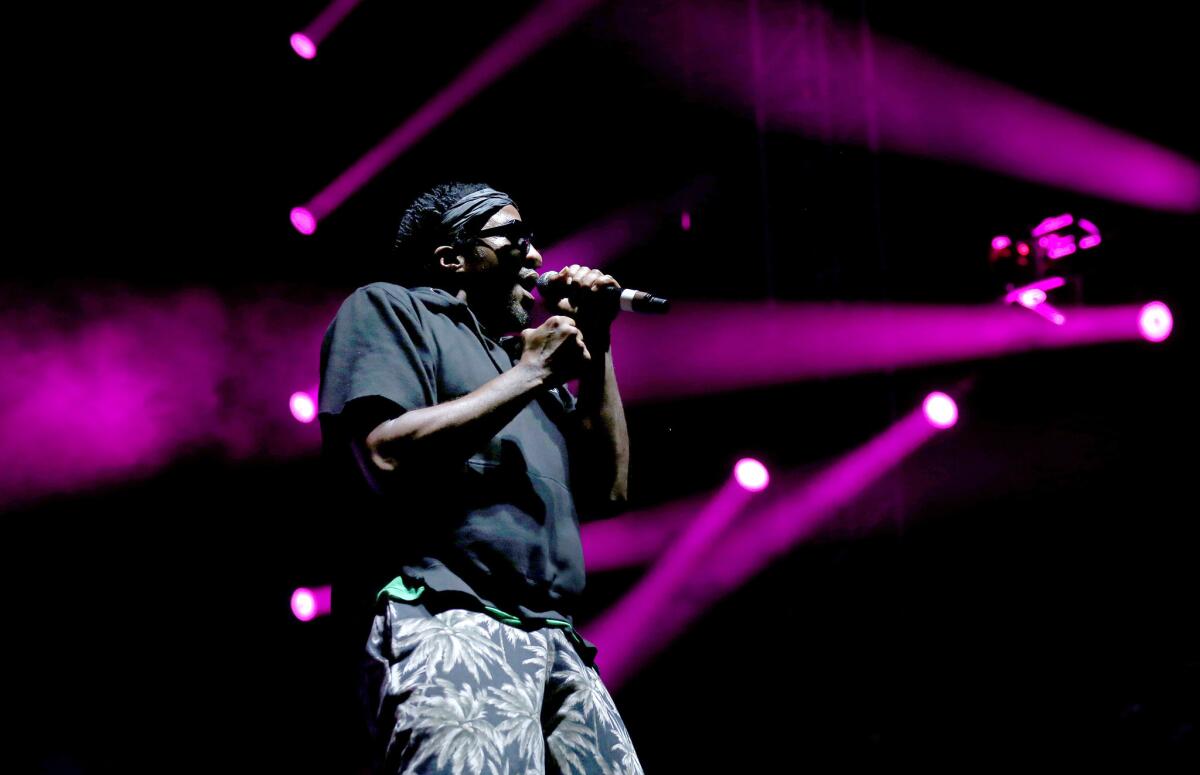
For all the strides the Grammys made in completing a long-overdue embrace of hip-hop in its 2018 nominees, there remained a glaring and all-too-depressing omission: the visionary group A Tribe Called Quest.
Released a year ago this month, “We Got It From Here… Thank You 4 Your Service” was an immediate critical favorite as Tribe emerged from a roughly 15-year hiatus and sounded as vital as ever despite the loss of influential co-founder Phife Dawg, who died in 2016 before the album was completed. The group’s performances to celebrate the release, which included a bittersweet tribute to Phife in a November appearance on “Saturday Night Live,” a farewell tour as well as a triumphant set at the 2017 Grammys with Busta Rhymes and Anderson .Paak, seemed to set the stage for a well-deserved awards-night victory lap for the group’s final statement.
Sadly, it was not to be. Hampered, perhaps, by that late 2016 release date, it was shut out in the Grammy nominations even as genre-mates Jay-Z and Kendrick Lamar led the way in the major categories. Even more disappointing, “We Got It From Here” marked the group’s final shot to win a Grammy award after losing out in 1997, 1999 and 2012 (for the documentary “Beats, Rhymes and Life: The Travels of A Tribe Called Quest”).
In another cruel twist, Tribe’s remarkable full performance from last year’s Grammys, which included the politically charged single “We The People,” has apparently been scrubbed from YouTube. So instead, take a moment and watch the group’s joyful “SNL” performance and consider where the group could and should have fit among this year’s nominees.
Allen Hughes got Dr. Dre and Jimmy Iovine to open up -- and now he’s up for his first Grammy
“The Defiant Ones” was one of the most ambitious projects Allen Hughes had tackled in his 25 years behind the camera.
The four-part miniseries, nominated for a music film Grammy, sought to chronicle the different yet deeply intertwining lives of billionaire music moguls Jimmy Iovine and Dr. Dre.
It was a wildly fascinating look into the rise (and falls) of both men separately — and together — with candid interviews from the subjects. Along the way, the film became a who’s who of contemporary music, with many of the players traced to Dre or Iovine.
But it almost didn’t happen – at least in the way we saw it.
In 2011, Hughes directed Dre’s “I Need A Doctor” video from his infamously shelved “Detox” record. Though the two had known each other for years, it was the first time they had worked together. And soon an idea of a Dre-focused documentary was born.
“I called HBO and it was an immediate green light,” Hughes recalled over the phone Tuesday morning. “And then they said, ‘One problem.’”
It turns out, Hughes explained, that the network had already agreed to a documentary on Interscope – the label that launched Dre’s nascent Death Row Records post N.W.A – and would be collaborating with Iovine, who cofounded the imprint in 1990 after working with acts like John Lennon, Bruce Springsteen, Patti Smith, Tom Petty, U2 and Stevie Nicks.
Hughes and Dre then went to Iovine with the idea of combining both projects, something that took some convincing.
“To be frank, he agreed to do it and then he got cold feet for a year,” Hughes said with a laugh.
Aside from the many interviews Hughes filmed -- Snoop, Ice Cube, Springsteen, Nicks, Smith, Petty, Gwen Stefani, Bono, Eminem and Trent Reznor all appear – he also got his hand on a bounty of unseen footage, including some incredible early glimpses at Dre and N.W.A. It was enough to hold up the project a bit.
“Unlike a feature film when you’re on a schedule, with a documentary you’re in a discovery process. I had heard rumors of this N.W.A footage that not even Dre had seen. I had to ask HBO for more time,” Hughes said.
“I’ve had so many people say to me, this was the first time they watched a film that showed hip-hop presented on the same level as classical, rock and other genres. It wasn’t treated lesser than,” Hughes continued. “I’m happy it got a Grammy nomination.”
‘I’m freaking out right now’: Luis Fonsi and more react to their Grammy nominations
Waking up to the news of a Grammy Award nomination — or two, or three — had several recording artists and songwriters taking to Twitter to celebrate Tuesday morning.
Here’s a look at what a few of the nominated acts had to say:
The mysterious production team Shampoo Press & Curl earns nods for Bruno Mars’ ‘24K Magic’
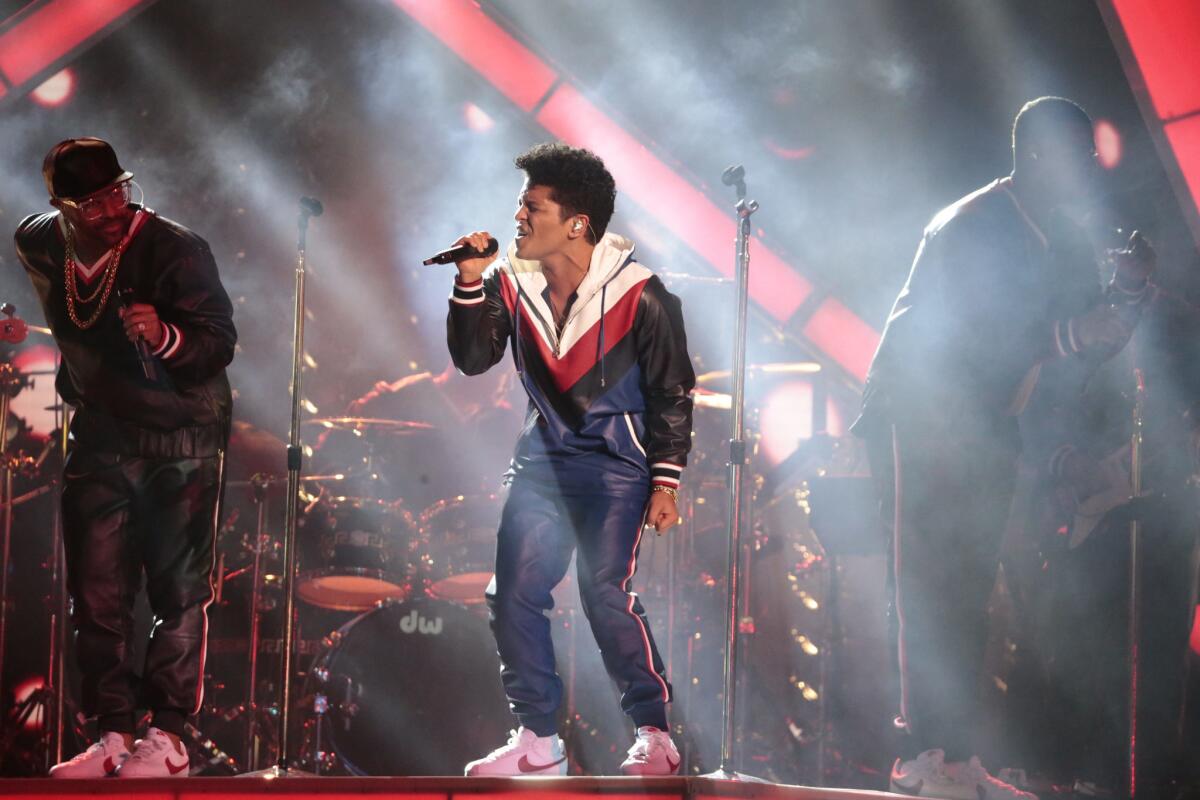
OK, maybe “mysterious” is the wrong word at this point, but the production team known as Shampoo Press & Curl earned three Grammy nominations on Tuesday morning for its work on Bruno Mars’ massive hit album“24K Magic.” Other than with Mars, the production team has no other credits.
But it’s not too hard to deduce its members, even if the origin story hasn’t officially been written. The songwriters included in Mars’ nominations for album of the year are identified as Christopher “Brody” Brown, James Fauntleroy, Philip Lawrence & Bruno Mars, and those credits permeate the album. Each time the team is cited as Shampoo Press & Curl, three of those four members are also listed as songwriters.
So who are they?
Mars himself is a member, and likely established Shampoo Press & Curl to add some clarity to the project.
Brown is a songwriter affiliated with the Inglewood music collective 1500 Or Nothin. Born in South Los Angeles, he has co-written or performed on songs with Mars (“Grenade”), B.o.B (“Nothin’ on You”) and Cee-Lo Green (“Forget You”).
Lawrence is best-known for his production and songwriting work with Mars as the Smeezingtons. Along with Ari Levine — who doesn’t get any credits on “24K Magic” — Lawrence helped establish Mars as a hit-maker and has Grammy trophies to prove it.
Then there’s Fauntleroy, who also is nominated for co-writing the songs on “24K Magic.” The Inglewood native has written or sung on tracks by Sza, Rihanna, Jay-Z and others, but in the album credits, his name appears separately on tracks produced by Shampoo Press & Curl, which would seem to exclude him from membership.
We’ll find out soon enough. Mars likely will earn a trophy or two for the work. When he takes the stage with them, hopefully one will explain the genesis of their name.
Carrie Fisher nets Grammy nod in spoken-word category, faces off with Springsteen and Bernie Sanders
Carrie Fisher continues to exhibit the posthumous power of the Force. The actress, who passed away in December 2016, was nominated Tuesday in the spoken-word category for her unflinching 2016 memoir, “The Princess Diarist.”
Though the daughter of Debbie Reynolds and Eddie Fisher was best known as an actress, and specifically for her role as Princess Leia in the “Star Wars” films, Fisher was also an acclaimed author who penned eight books. She was previously nominated in this same category for her 2009 book, “Wishful Drinking.”
Although she had written about her life extensively before, “The Princess Diarist” was notable for its deep dive into Fisher’s time making “Star Wars,” from tales from the make-up chair to the revelation of a brief affair the then-19-year-old actress had with costar Harrison Ford.
In addition to this Grammy nomination, Fisher also received a posthumous Emmy nomination earlier this year for her guest role on the Amazon comedy “Catastrophe.”
Fisher isn’t the only person with a tie to the “Star Wars” universe receiving Grammy recognition. Donald Glover, who will star as Lando Calrissian in the forthcoming “Solo: A Star Wars Movie,” received five nominations for his work as Childish Gambino, his hip-hop/R&B alter ego. (Calrissian, as played by Billy Dee Williams, you may recall, first betrayed, then helped free Princess Leia in “The Empire Strikes Back.”)
Fisher has some formidable competition in the spoken-word category, including Sen. Bernie Sanders and actor Mark Ruffalo for Sanders’ “Our Revolution: A Future to Believe In.”
Then there’s Bruce Springsteen reading his memoir “Born to Run.” Other nominees include astrophysicist Neil DeGrasse Tyson, nominated for his book “Astrophysics for People in a Hurry,” and “Confessions of a Serial Songwriter,” by Shelly Peiken, the tunesmith behind hundreds of songs (Christina Aguilera’s “What a Girl Wants” and “Bitch” by Meredith Brooks).
‘Game of Thrones’ gets its first Grammy nomination
Winter is coming to the 2018 Grammy Awards: “Game of Thrones” nabbed its first Grammy nomination Tuesday morning.
“Game of Thrones” composer Ramin Djawadi was nominated in the category for score soundtrack for visual media for his work on Season 7 of the hit HBO fantasy series. Djawadi was previously nominated for a Grammy for composing the score of “Iron Man.”
While this is “Thrones’” first Grammy nod, the score from the series has been previously nominated for a Creative Arts Emmy for the Season 4 episode “The Mountain and the Viper.” The music from the series has also been recognized by the International Film Music Critics Assn.; the American Society of Composers, Authors and Publishers; the Hollywood Music in Media Awards and the World Soundtrack Awards.
This is also the first nomination from any of the major critical awards for “Game of Thrones” Season 7, which missed the eligibility period for the 2017 Emmy Awards.
The other nominees in the score soundtrack for visual media category are: Jóhann Jóhannsson for “Arrival,” Hans Zimmer for “Dunkirk,” Benjamin Wallfisch, Pharrell Williams and Hans Zimmer for “Hidden Figures” and Justin Hurwitz for “La La Land.”
“Game of Thrones” will return to HBO for an eighth and final season. A premiere date has not yet been announced.
How Snapchat helped Khalid become a superstar
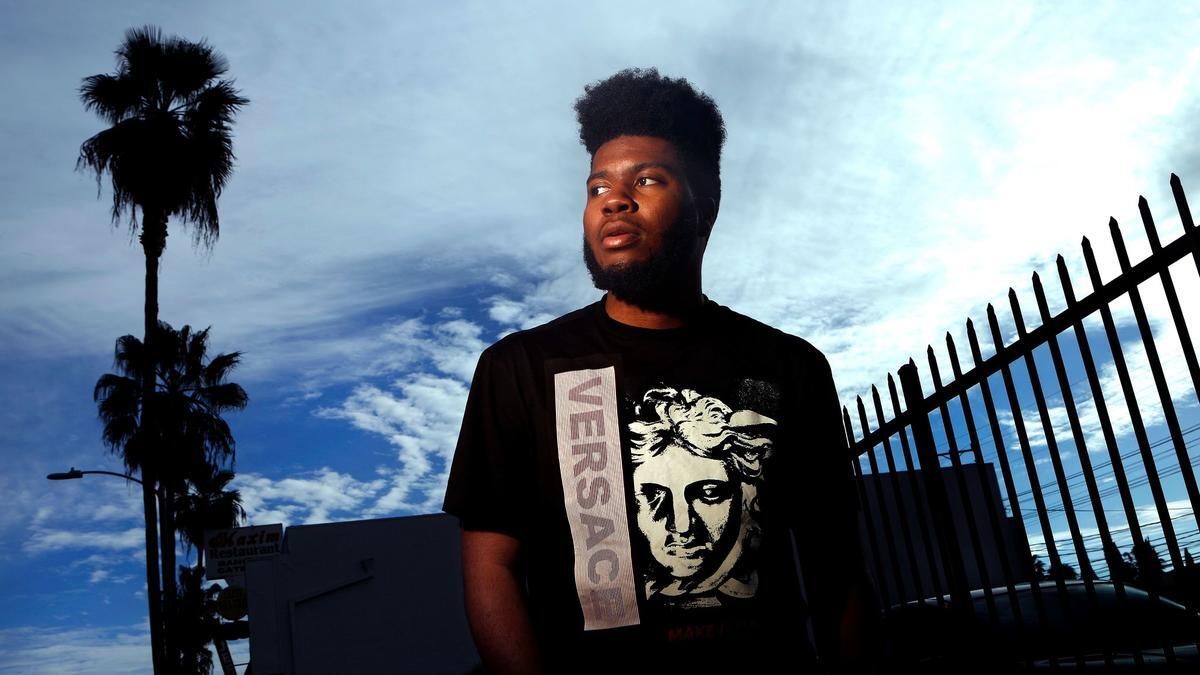
Khalid Robinson had already told his mom he planned on pursuing music instead of going to college when he got the unlikeliest of co-signs: Reality star Kylie Jenner.
The El Paso teen, like many aspiring musicians, was uploading the music he was making to his Soundcloud account.
His first song was trashed by a classmate, something his entire high school found out about. “Instead of giving up, it kind of gave me the inspiration to keep going,” Robinson said in an interview with The Times earlier this year.
However, the next record he uploaded, an earnest ballad called “Saved,” elicited a far better response from the kids at school.
And then came “Location,” a soulful, guitar-kissed ode to technology’s role in coupledom he uploaded before graduating high school.
Both tracks showcased Robinson’s honeyed voice and his knack for mixing sultry alternative R&B, acoustic folk and ’80s new wave.
The music quickly caught the attention of many more supporters and hit a tipping point when Jenner posted videos of herself on Snapchat lip-synching to “Saved” and “Location,” her millions of followers latching on to the cherubic-faced teen.
“Location” went on to log over 17 million streams in a matter of months on Soundcloud (the number now stands at 70.7 million), became a top 10 R&B hit and drummed up hype for his debut, “American Teen,” which is up for urban contemporary album and R&B song for “Location.” Robinson scored five nods in total, including song of the year for a collaboration with Logic and Alessia Cara.
“That kind of rushed everything a little bit more,” he recalled of his Snapchat boost. “It’s kind of crazy to think that somebody’s Snapchat can have the influence on what your career becomes. I think that’s pretty insane.”
Grammy nods for women, people of color an encouraging sign the Recording Academy is paying attention
From Frank Sinatra in the 1960s to Paul Simon in the 1970s to U2 in the 1980s, ’90s and early 2000s, one set of musicians has long had reason to feel secure in its privileged position at the Grammy Awards.
Well, roll over, white guys, and tell Beethoven the news.
For the first time in the ceremony’s six-decade history, a woman and people of color have squeezed the Recording Academy’s go-to demographic from among the principal artists in contention for album of the year, the flagship category in nominations announced Tuesday for the 60th annual Grammys.
Odesza, Bonobo herald a new post-EDM wave at the Grammys
Rave-scene observers have wondered what the future holds for the post-EDM era. The major festivals have taken some hits for booking much the same lineups at the top of their bills for years — one reason being that the scene hasn’t made many new superstars of the Skrillex/Deadmau5/Zedd caliber in a while.
This year’s Grammys may offer some hints at the next generation of arena-sized acts to come out of the genre. Two artists — the L.A.-based genre-hopper Bonobo and the live juggernaut Odesza — are up for both dance recording and dance/electronic album.
Each have had huge years — Odesza headlined Staples Center and Bonobo did the Greek — and appear to be consensus picks for Grammy stardom at a time when few mainstream dance acts can compete amidst the current wave of hip-hop on streaming services. Even more interesting: They both did it on divisions of the same indie label, the electronic music stalwart Ninja Tune.
There are some other contenders — LCD Soundsystem’s comeback single “Tonite,” a Kraftwerk box set — but if one or both of those two sweeps the genre, it’s clear that a new era has ascended in dance music at the Grammys.
New artist nominee Sza almost quit music before breaking out with ‘Ctrl’
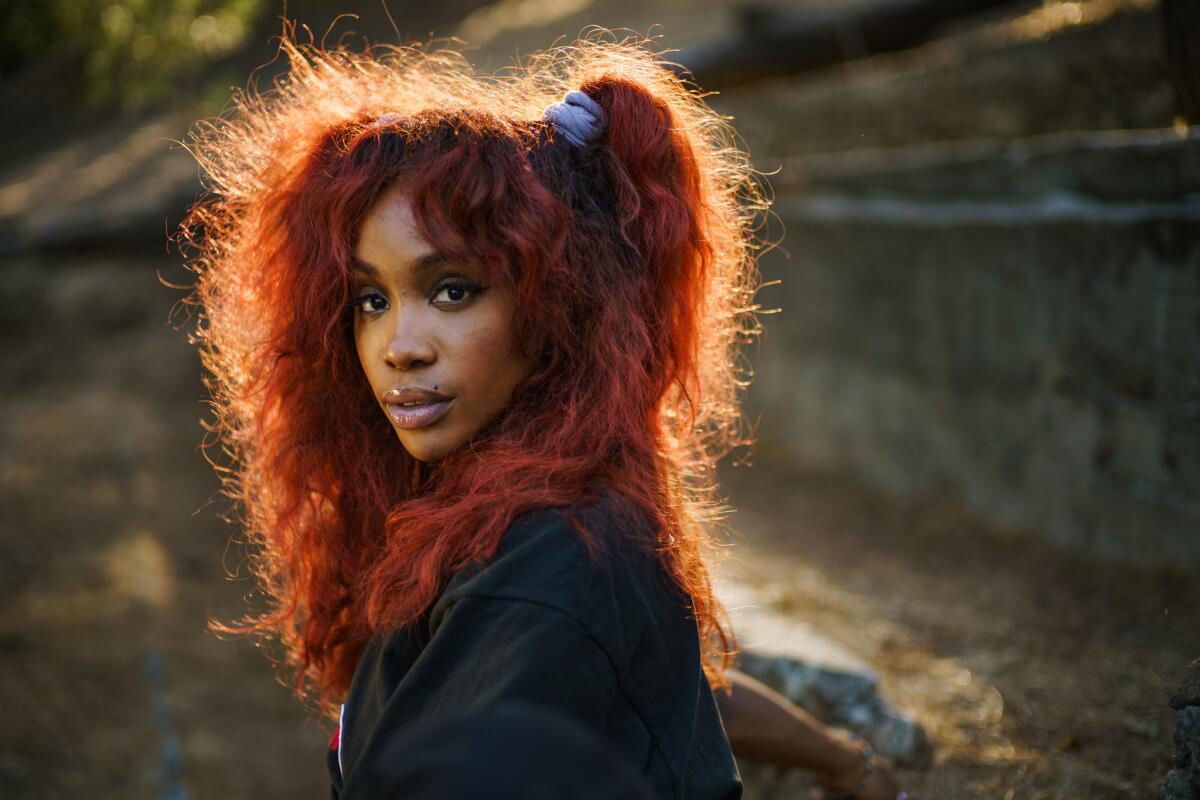
This time last year, new artist nominee Sza was ready to call it quits on her recording career.
A fierce self-critic, the singer-songwriter born Solána Rowe found herself trapped in a sea of doubt, fear and anxiety as she recorded what became her breakout debut, “Ctrl.”
“I’m a Scorpio with a Pisces moon. I am very critical of myself. I’m actually way less critical of others than I am of myself,” she told the Times earlier this fall. “I’m in my own head a lot. It’s hard and really discouraging.”
Raised Orthodox Muslim in a household where television and radio was forbidden, she didn’t really get into music until she discovered acts like Björk, Jay-Z, Common, Wu-Tang Clan, Nas and Outkast at gymnastics camp as a teen.
Because she didn’t have a traditional musical background — “I didn’t play instruments, and I didn’t grow up singing in church” — Rowe often doubted the work she was creating in the studio.
And despite working with Rihanna and Beyoncé as well as booking festivals on the strength of her early mixtape work, her fears and insecurities were getting the best of her and she told her followers that she was hanging it up.
Ultimately, her label, Top Dawg Entertainment, intervened — cutting her off from the studio and mining the hundreds of songs she already had cut to build “Ctrl.”
The album, like her earlier mixtapes, is an aching, brazen work that explores love, sex, black womanhood and identity with unflinching honesty.
Released in June, “Ctrl” hit a vein — particularly among young black women — and it topped the R&B albums chart before going gold. The record is up for several Grammys, including urban contemporary album, with her breakout singles “Supermodel,” “Love Galore” and “The Weeknd” all landing genre song nods. It was enough to make her this year’s most nominated female artist.
When we spent time with Sza over a few days this fall for a feature (read it after the jump), she was still in disbelief that anyone was paying attention to her music.
“I wasn’t expecting people were going to show a … lot of attention,” she said. “Every moment, I’m shocked. It’s taught me a lesson on energy and expectation.”
Expressive jazz pianist Fred Hersch receives a Grammy spotlight
After a year that saw the release of his heartfelt memoir “Good Things Happen Slowly” and another splendid solo album, pianist Fred Hersch will again vie for his first Grammy Award after receiving two nominations in the jazz categories Tuesday morning.
The expressive “Open Book” was among the releases recognized in the jazz instrumental album category, which includes Bill Charlap’s “Uptown, Downtown,” Billy Childs’ “Rebirth,” “Project Freedom” by Joey DeFrancesco & the People and Chris Potter’s “The Dreamer Is the Dream.”
Potter and Childs also join Hersch in the improvised solo category, a field that features violinist Sara Caswell and fleet-fingered guitarist John McLaughlin, who was recognized for his work on “Miles Beyond,” a song from his Mahavishnu Orchestra days that appeared on his 2017 album, “Live at Ronnie Scott’s.” (McLaughlin comes to Royce Hall on Dec. 9 with what’s billed as his final U.S. tour.)
Grammy snubs: Ed Sheeran and Post Malone largely left out in the cold
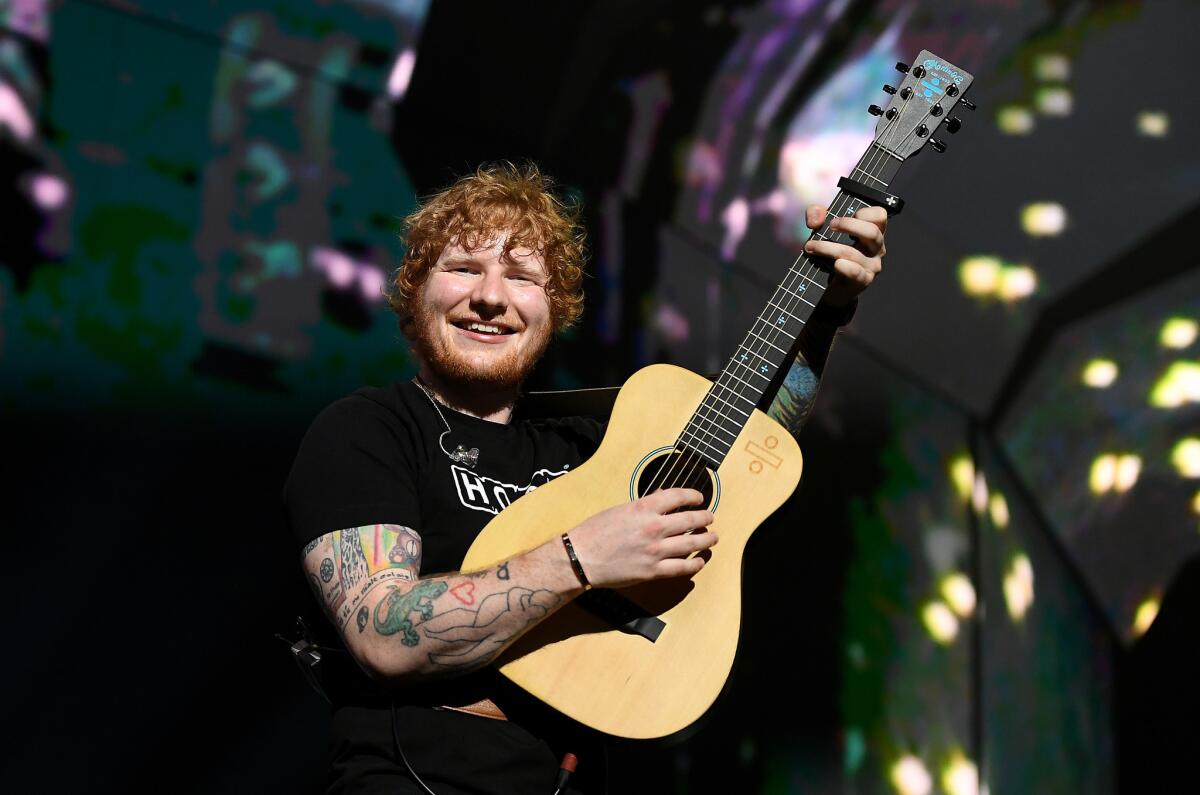
Yes, it’s an honor just to be nominated and blah blah blah. But for some artists hoping for massive triumph, the news wasn’t great. Below are a few who may be reassessing their award season campaigns.
Going into Grammy season, prognosticators had easy odds on two artists in particular competing for album, song and record of the year: English singer-songwriter Ed Sheeran for work from his album “Divide” and Compton rapper Kendrick Lamar for “Damn.”
Bad news for so-called Sheerios who follow the British heartthrob. The only major award in Sheeran’s immediate future is for biggest Grammy snub. Not only did “Divide” fail to earn a major Grammy nod — although it did earn one for pop album — but his shoo-in song, “Shape of You,” didn’t get a major song nomination.
The song, which alighted the hearts of moms and daughters the world over, instead got a less-prominent nod in the pop performance category.
As well, those hoping that pop singer Kesha’s return to the spotlight would lead to a joyous Grammy redemption moment may have mixed feelings. After publicly battling with her label head, Dr. Luke, she issued the acclaimed album “Rainbow,” which featured the hit “Prayer.”
The Hollywood ending in which Kesha triumphantly accepts album of the year, however, isn’t going to happen. Like Sheeran, Kesha earned two pop music nods — and will compete with him in both categories.
Even further out in the cold is rising rapper Post Malone, whose song “Rockstar” was one of the year’s biggest hits. The artist rode to success after appearances on tracks from Kanye West, Gucci Mane and Justin Bieber, and became one of the most discussed — and polarizing — rappers in the business.
Voters didn’t care — and ignored him when considering nominations.
Perhaps that was for the best. Had he earned the attention, there’s a good chance that a recent quote would have followed him to the ceremony. “If you’re looking to think about life, don’t listen to hip-hop,” Malone recently told a Polish news site. Needless to say, rap Twitter offered a counterpoint.
Major Grammy categories pit Jay-Z (New York) and Kendrick Lamar (Los Angeles) in battle for hip-hop bragging rights
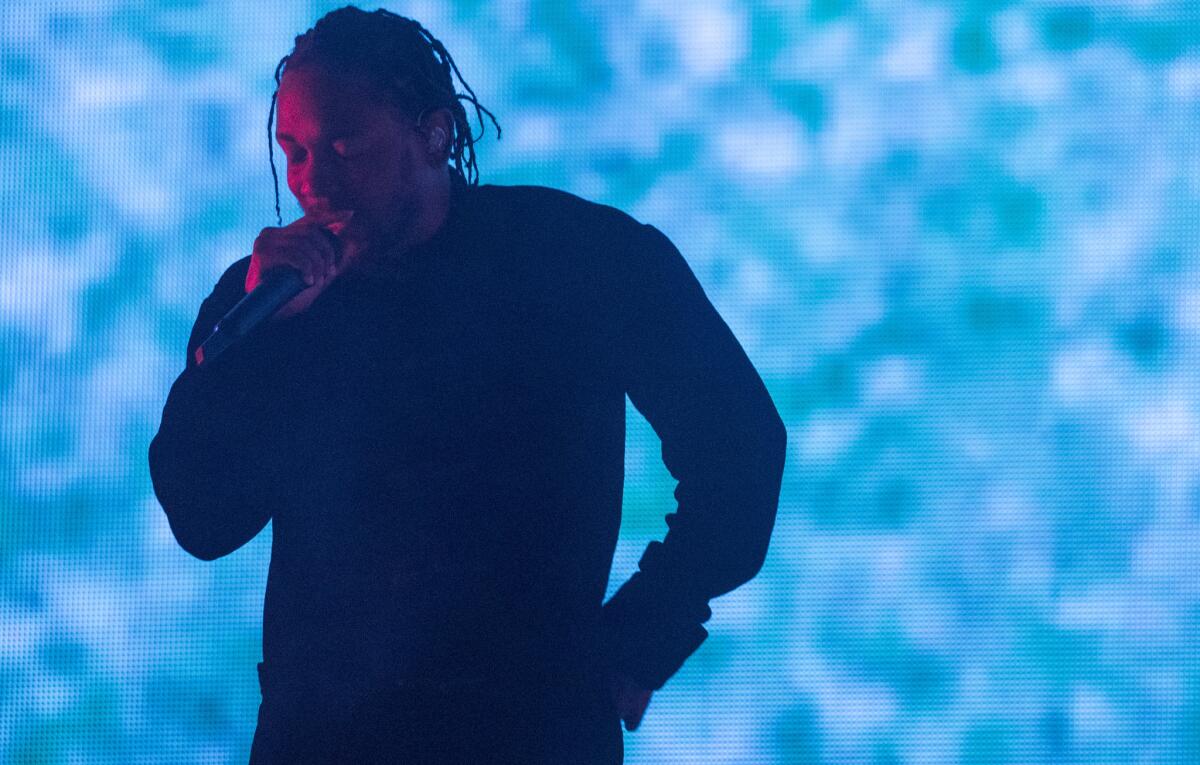
Those schooled in rap history understand that rivalries have played a crucial role in the genre’s narrative, with the competition between coasts at the heart.
Whether it was Southern California rappers N.W.A and Snoop Dogg working to wrest attention from Public Enemy and Eric B. & Rakim, or Tupac Shakur representing California against Brooklyn rapper Biggie Smalls in the ’90s, or even The Game going after Jay-Z a decade later, regional pride has played a key role in the music’s evolution.
This year’s Grammy duality arrives via Compton’s Kendrick Lamar, whose album “Damn” helped earn him seven nominations including album of the year, and Brooklyn’s Jay-Z, who eclipsed him with eight. The two artists will be competing head to head in all but one category, song of the year, for which Jay-Z’s “The Story of O.J.” earned a nod.
Kesha finally gets her first Grammy nominations
She’s had three No. 1 singles, two No. 1 albums and has been through more personal and legal trouble than any singer should ever have to in order to get an album out.
Now Kesha finally has her first Grammy nominations.
The artist scored a nomination in pop solo performance for “Praying,” her redemptive ballad after years of court fights against her former producer, Dr. Luke, whom she accused of sexual assault, as well as pop vocal album for “Rainbow.”
It could have been a notable gesture in the ongoing groundswell against sexual assault and harassment had the Recording Academy voters given her a top-four category nod. The record, after all, had a lot for voters to like — a classic rock-infused sound, a No. 1 sales slot and the force of a pop artist coming back to make the statement piece of her career.
While she didn’t score a record or song of the year nod, or even one for album of the year, at least she was welcomed to the club.
Cardi B could have been another reality star trope — instead she made rap history
“If a girl have beef with me, she gon’ have beef with me foreva,” Cardi B hissed with a biting venom that would make even Medusa cower.
It was a line that instantly turned the woman born Belcalis Almanzar into a breakout star of VH1’s hit reality series “Love & Hip Hop: New York” when she came aboard for the show’s sixth season last year.
The self-described “regular, degular, shmegular girl from the Bronx” stole just about every single scene she appeared in during her two-season run on the series. Her catch-phrases — expect to see “Washpoppin” in the dictionary at some point — and a deep-seated aversion to having a filter made her reality TV catnip.
But where so many others have used reality fame to boost products and the inevitable spinoff, Cardi turned it into rap gold — something her co-stars have so often failed to do.
And now she’s making Grammy history.
“Bodak Yellow” has secured two nominations, for rap song and rap performance — the latter of which has never seen a woman nominated on her own.
Not bad for someone who wasn’t even a rapper before last year.
She put out her first mixtape, “Gangsta Bitch Music, Vol. 1,” last year at the height of her prominence on “Love & Hip Hop.” It was heavy on the raunchy, profane and hilarious one-liners that made her a TV star, and when paired with beats tailor-made for rattling cars and shaking strip clubs (she’s a former dancer), the project wound up being an irresistible offering of bawdy jams.
And she didn’t stop there.
“Vol. 2” dropped at the top of the year, and by the spring, she had inked a deal with Atlantic Records. Then came “Bodak Yellow,” a mind-numbing trap joint that became one of the year’s unlikeliest earworms (the chorus, while sticky, is gloriously profane and comes with a reference to gangs).
“Bodak Yellow” announced Cardi B as a legitimate rap star, the song racing up the charts and eventually knocking Taylor Swift off the top of the pop category.
She became the first female rapper to score a solo No. 1 since Lauryn Hill’s “Doo Wop (That Thing)” nearly two decades ago. That she did it without a male cosign — historically a prerequisite for women in hip-hop — was all the more impressive.
Meet Taylor Swift, behind-the-scenes songwriter
Unlike the lead singles from her previous two albums, Taylor Swift’s “Look What You Made Me Do” — the first taste from her just-released “Reputation” — was not nominated for a Grammy Award. (“Reputation” itself came out after the Sept. 30 cutoff date for eligibility.)
But Swift is up for two Grammys — just not as a performer.
“Better Man,” the dreamy ballad she wrote for Little Big Town, is in contention for best country song along with Sam Hunt’s “Body Like a Back Road,” Chris Stapleton’s “Broken Halos,” Midland’s “Drinkin’ Problem” and Miranda Lambert’s “Tin Man.”
And in the best song written for visual media category, Swift is nominated as one of the songwriters responsible for “I Don’t Wanna Live Forever,” her and Zayn Malik’s hit from the “Fifty Shades Darker” soundtrack. (It’ll go against tunes from “La La Land,” “Moana,” “Lion” and “Marshall.”)
Grammy voters have felt warmly about Swift’s tunesmithing in the past.
“Safe & Sound,” the song she penned with the Civil Wars for the first “Hunger Games” film, won a Grammy in 2013, and she’s taken the prize for best country song twice: first with “White Horse,” then with “Mean.”
‘Man, this is insane’: rising R&B star Khalid shocked after Grammy nods
It’s no secret that 19-year-old singer-songwriter Khalid had a huge year with his inventive debut album, “American Teen.” On Tuesday, the Georgia-born artist scored five Grammy nominations, including for new artist.
Khalid was recognized for collaborating on Logic and Alessia Cara’s socially conscious single “1-800-273-8255,” which earned nominations for song of the year and music video. His single “Location” earned a nod in the R&B song category, and “American Teen” was nominated in the urban contemporary album field.
Grammys 2018: Complete list of nominees
When the young star heard the news Tuesday morning, he quickly took to Twitter to share his excitement and gratitude and also announced his Roxy Tour next year. (It comes to L.A.’s Greek Theatre on May 9.)
The 60th Grammy Awards show will air live from New York City’s Madison Square Garden on Jan. 28, 2018.
Death is no barrier to Grammy Awards
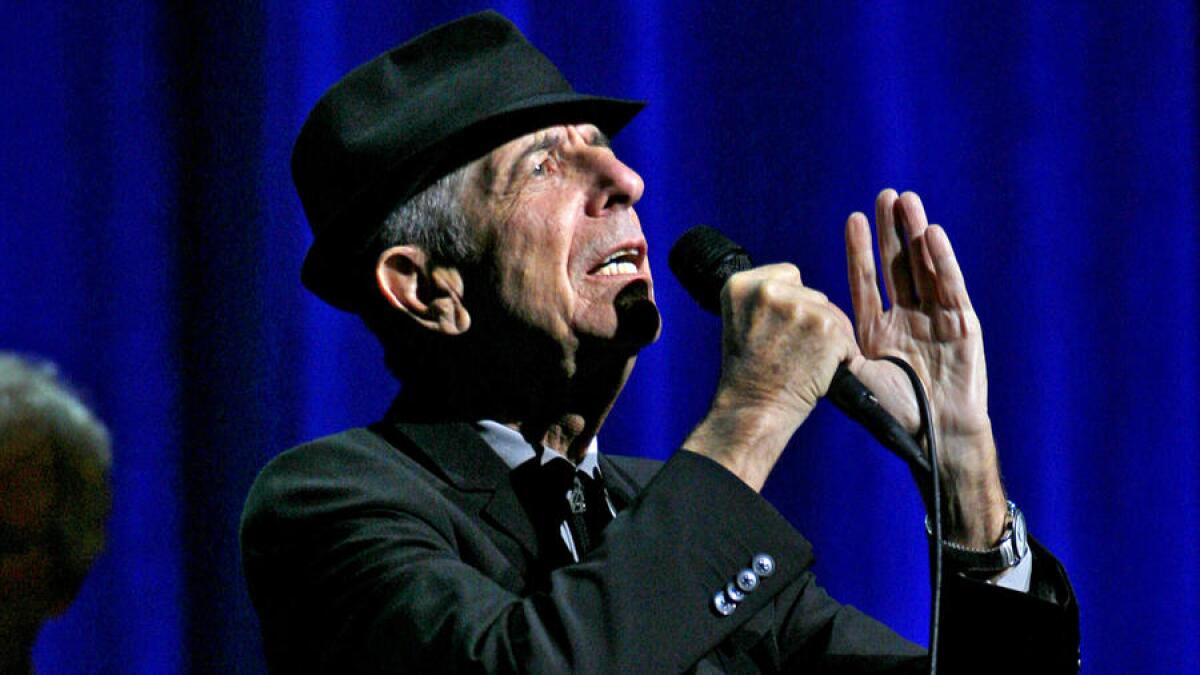
Once again, Recording Academy voters have set the stage for potential posthumous Grammy Awards to several artists who died recently.
Canadian poet-songwriter Leonard Cohen, who died Nov. 7, 2016, at 82, shortly after releasing his album “You Want It Darker,” is nominated in two categories.
The title track is up for rock performance, and the song “Steer Your Way” is vying in the American roots performance category.
In the latter, he’s nominated with Glen Campbell, whose long battle with Alzheimer’s disease ended with his death on Aug. 8, at 81. Campbell received a nod for the autobiographical track “Arkansas Farmboy” from his album “Adios.”
Allman Brothers Band co-founder Gregg Allman, who died May 27 at 69, has nominations in two categories: in American roots song for “My Only True Friend,” which he wrote with Scott Sharrard, and in Americana album for his “Southern Blood” album.
Soundgarden/Audioslave/Temple of the Dog singer-songwriter Chris Cornell, who died at 52 on May 18, is nominated for rock performance for “The Promise,” a song he wrote for the feature film of the same title that explored the Armenian genocide in the early 20th century.
There were no recordings released by Tom Petty during the Grammy eligibility period that would have allowed voters to increase his 18 lifetime nominations in the wake of his death on Oct. 2 at 66.
Linkin Park’s “One More Light” album, released just two months before lead singer Chester Bennington died July 20 at 41, landed zero Grammy nominations.
All, however, are likely to be saluted during the In Memoriam segment of the annual Grammy Awards telecast.
Here’s why Taylor Swift was shut out from the top 2018 Grammy categories
What, no Grammys love for Taylor Swift’s “Reputation”?
Simply put, the pop superstar’s new album — which sold more than 1.2 million copies in its first week — did not make the cutoff date to be eligible for the 2018 Grammys. The Recording Academy required albums to be released between Oct. 1, 2016, and Sept. 30 to qualify. “Reputation” dropped Nov. 10.
Of course, “Look What You Made Me Do” was released during the qualification window. It just wasn’t nominated.
But Swift wasn’t completely shut out of the Grammys race. She scored two nominations for her songwriting work on Little Big Town’s “Better Man” as well as “I Don’t Wanna Live Forever” from the “Fifty Shades Darker” soundtrack.
Straddling Grammy eligibility periods is not a new move for Swift. The lead singles for both “1989” and “Red” were released in time to qualify for one awards cycle before the albums themselves.
But unlike “Look What You Made Me Do,” “We Are Never Ever Getting Back Together” and “Shake It Off” were both nominated.
FOR THE RECORD
9:35 a.m.: A previous version of this article stated that Taylor Swift won Grammy Awards for “We Are Never Ever Getting Back Together” and “Shake It Off.” Neither won Grammys.
‘Despacito,’ the year’s runaway hit sung in Spanish, could make Grammy history
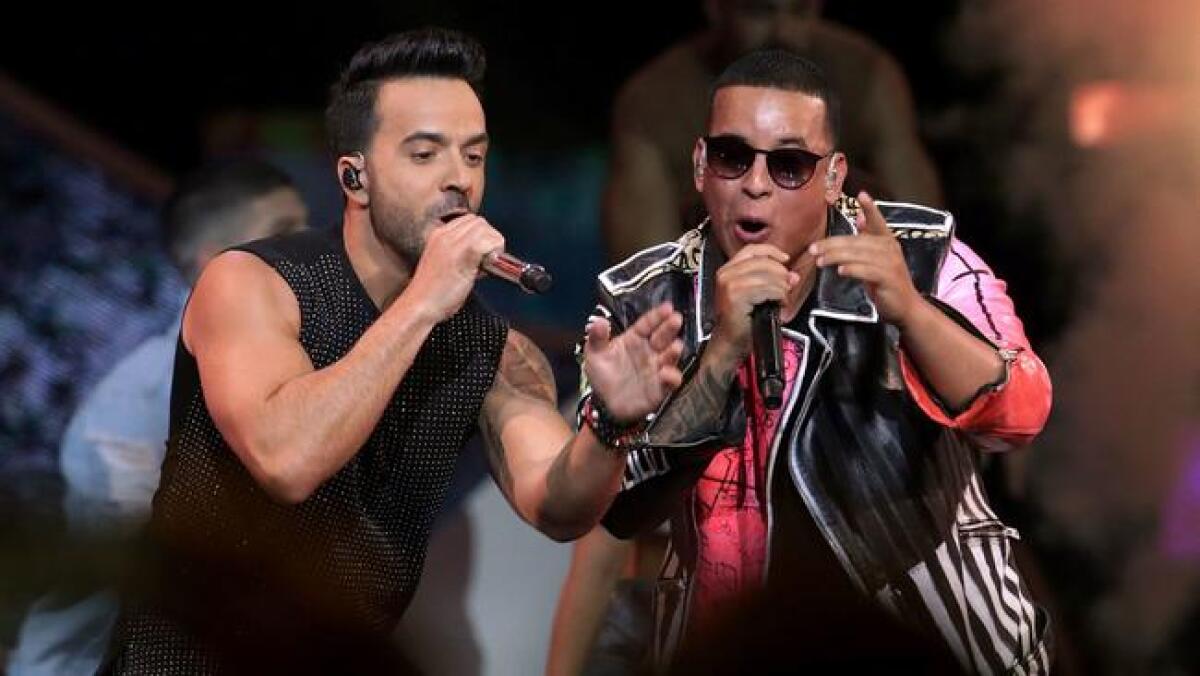
If “Despacito” were to win the Grammy for song of the year, it would be in extremely rare company. And it could make history as the first Spanish-language song to do so.
The last time a non-English-language tune took home the award for that category? The very first Grammys in 1959, when Domenico Modugno and Franco Migliacci won for “Volare,” sung in Italian by Modugno.
(OK, it’s a stretch, but the Beatles’ “Michelle” has a notable passage in French, and it won for song of the year in 1967.)
So a win for “Despacito,” as performed by Luis Fonsi and Daddy Yankee, would send a powerful message that Spanish-language pop songs – not just Latin music in general — are a force to be reckoned with. (It’s also nominated for record of the year.)
Now there’s even less of an excuse for Justin Bieber not to know the words.
Kendrick Lamar’s lifetime Grammy nods now just short of 30
Kendrick Lamar’s seven Grammy nominations bring his all-time total to an impressive 29 — including three for the Recording Academy’s most prestigious prize, album of the year. (In January, his “Damn” will compete for that title with Jay-Z’s “4:44,” Bruno Mars’ “24K Magic,” Lorde’s “Melodrama” and “Awaken, My Love!” by Childish Gambino.)
But how many Grammys has the celebrated Compton rapper actually taken home?
The answer is seven.
Though he lost album of the year both times he was previously nominated — first to Daft Punk’s “Random Access Memories” in 2014, then to Taylor Swift’s “1989” in 2016 — Lamar won best rap song and best rap performance two years in a row.
In 2015, he took the trophies with his song “i,” from “To Pimp a Butterfly.” And last year he did the same with another track from that album, “Alright.”
Lamar’s three other Grammy wins also came in 2016: for best rap/sung collaboration (for “These Walls”), best rap album (“To Pimp a Butterfly”) and best music video (the remix of Swift’s “Bad Blood”).
In addition to album of the year, his latest nominations are for record of the year, best rap performance, best rap song and best music video (all for “Humble”), best rap/sung performance (“Loyalty”) and best rap album.
Grammy 2018 by the numbers
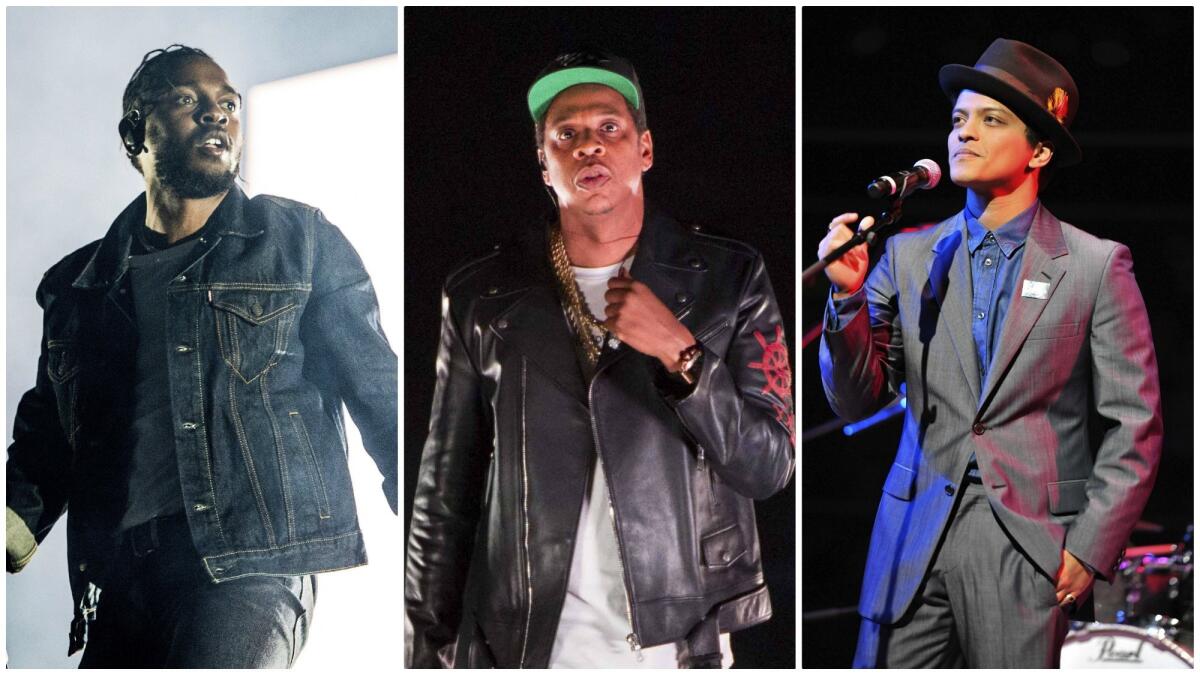
The 2018 Grammy nominations were unveiled Tuesday morning, with Jay-Z, Kendrick Lamar and Bruno Mars among the top nominees.
Jay-Z, who has accumulated 66 nominations in years past, added eight new nods to his tally. Lamar followed with seven nominations, bringing up his total haul of Grammy nods over the years to 29. Rounding out the top three was Mars, who earned six nominations.
All three artists have already won multiple Grammys in previous years, with Jay-Z having amassed 21 awards throughout his career thus far. An impressive feat but there is one 2018 nominee who has racked up even more wins over the years than Jay-Z. Alison Krauss, who earned two nominations this year, is a 27-time Grammy-winner (the most of any female artist).
Here is a breakdown of artists who received three or more nominations this year (the asterisks denote artists that are members of a nominated group).
Jay-Z: 8
Kendrick Lamar: 7
Bruno Mars: 6
Childish Gambino: 5
Khalid: 5
No I.D.: 5
SZA: 5
Alessia Cara: 4
Chris Brody Brown: 4
John Hanes: 4
Justin Hurwitz: 4
Morten Lindberg: 4
Philip Lawrence: 4
Serban Ghenea: 4
Ben Anderson*: 3
Charles Moniz: 3
Chris Stapleton: 3
Chuck Owen: 3
Daddy Yankee: 3
Daniel Oliver*: 3
Dave Kutch: 3
James Fauntleroy: 3
Jeremy Reeves*: 3
Jonny Hawkins*: 3
Jonathan Yip*: 3
Justin Bieber: 3
Ledisi: 3
Ludwig Goransson: 3
Luis Fonsi: 3
Mark Vollelunga*: 3
Nothing More: 3
Pharrell Williams: 3
Ray Charles McCullough II*: 3
Ray Romulus*: 3
Tom Coyne: 3
Grammys 2018: Complete list of nominees
The Grammy Awards have embraced rap and hip-hop in the top categories this year, as today’s nominations include several major nods each for Jay-Z, Kendrick Lamar and Childish Gambino.
Jay-Z leads this year’s pack with eight nominations, while Lamar picked up seven, and pop singer-songwriter Bruno Mars earned six. Gambino, the alter ego of Emmy-winning actor-director Donald Glover, netted five nominations, along with singer Khalid and producer-songwriter No I.D.
One of the year’s biggest hits, the remix version of Luis Fonsi & Daddy Yankee’s “Despacito,” featuring Justin Bieber, has become the first non-English-language track to be nominated in both the song and record of the year categories. Album of the year nominees are Jay-Z’s “4:44,” Gambino’s “Awaken, My Love!,” Lamar’s “Damn.,” Lorde’s “Melodrama” and Mars’ “24K Magic,” while the song of the year section includes “4:44,” Julia Michaels’ “Issues,” Logic with Alessia Cara and Khalid’s “1-800-273-8255,” Mars’ “That’s What I Like” and “Despacito.”
Grammys get in tune with hip-hop and diversity for 2018 nominations
After treading cautiously through the realm of hip-hop for nearly four decades, the Recording Academy belatedly has embraced the genre wholeheartedly in its most prestigious categories for the 60th Grammy Awards, nominations for which were announced Tuesday.
Combined, genre stars Jay-Z and Kendrick Lamar received 15 nominations, and one-time rapper Childish Gambino, the musical alter-ego of actor Donald Glover (“Atlanta,” “Solo: A Star Wars Story”) received five nods for his more recent, funk-leaning work.
Will Grammy voters stand with Kesha?
There’s no denying the gravity of the movement around sexual assault and harassment in the last few months. No one in music today has been wrapped up in this conversation as much as Kesha, whose years-long battle with her former producer (and alleged assaulter) Dr. Luke is the shadow behind her powerful, chart-topping comeback album “Rainbow” and its searing-yet-hopeful single “Praying.”
The academy could make a statement on the cultural climate by acknowledging the record’s bravery — and laud an artist who overcame more than just about anyone to return to the top of the pop world.
Rap could be this year’s most exciting field

With the charts and pop radio heavily tilted toward rap at the moment, there’s so many recognizable artists in the mix for the rap Grammys that, beyond Lamar, the nominations are anyone’s guess. At the 2016 ceremony, Lamar won all four trophies in the rap categories — making him the third act to score a clean sweep after Eminem and Kanye West. And he just might do the same this year.
Yet the competition for rap album is particularly fierce. Jay-Z, A Tribe Called Quest, and J. Cole are serious contenders. Future’s back-to-back releases could very well see him in two categories (rap and urban contemporary album) and there have been so many massive rap singles this year that the song categories will be stacked. Migos, Cardi B, Future, Yo Gotti, Big Sean, Post Malone and Lil Uzi Vert could all keep Lamar from a sweep.
Best new artist is, once again, anyone’s best guess
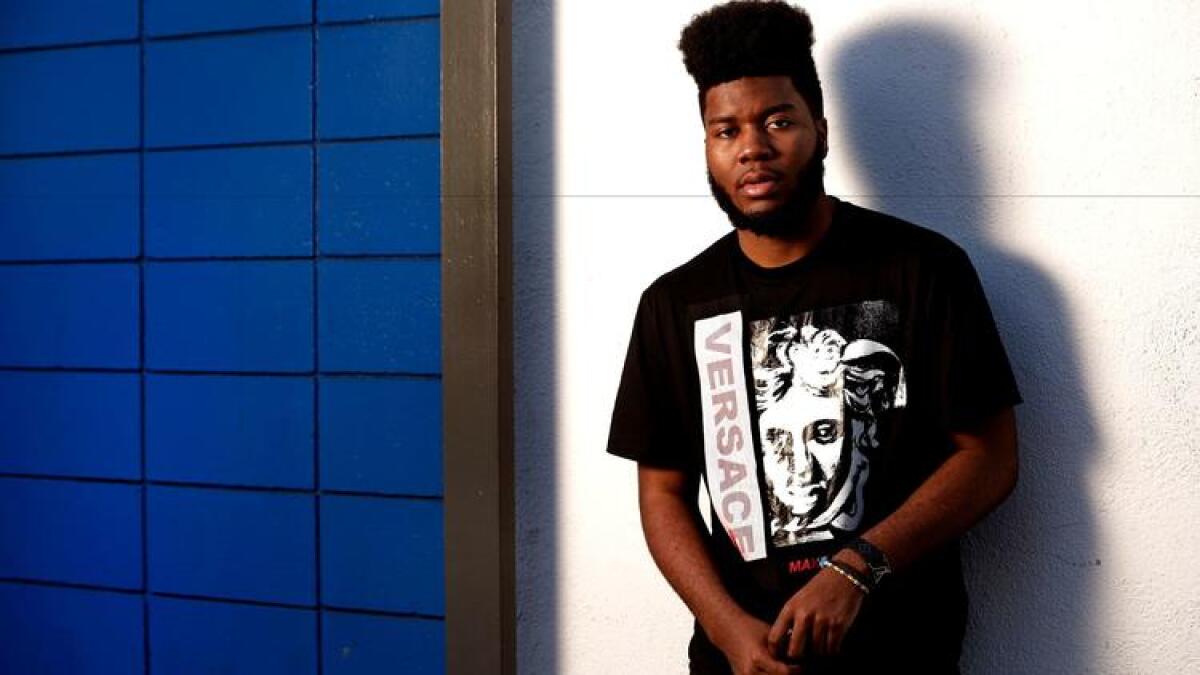
The competition for new artist is as hot as ever, with a slew of fresh faces having broken out this past year. Eligibility rules for this one are complicated, making it hard to predict, but alternative-R&B singers SZA and Khalid have had huge years with their inventive debuts. Julia Michaels, who penned hits for Justin Bieber, Britney Spears, Selena Gomez and Fifth Harmony before stepping to the forefront, is also a front-runner for a nomination.
Pop artist Alessia Cara should have been nominated last year, as her album “Know-it-All” was released in 2015, but she’ll be tough to ignore this go-around after having a little more chart success, not to mention her collaboration with Zedd, “Stay.”
Rappers Post Malone, Cardi B, Lil Uzi Vert, Playboy Carti and Logic had some of the year’s biggest hits and voters could look to rectify hip-hop’s long tradition of being underrepresented in this category by nominating multiple emcees. Yet the Grammys have always loved a good redemption story, and crooner James Arthur bounced back with the ballad “Say You Won’t Let Go,” which helped rescue him from a seemingly torpedoed career years after a string of offensive lyrics had him ostracized. Country acts Luke Combs, Kane Brown and Old Dominion all have a strong shot here, as does indie band AJR and pop singers Zara Larson and Dua Lipa.
This is where the Grammys are born — in a remote mountain workshop in Colorado
Few places feel more removed from the glamorous world of the entertainment industry than this remote town high in the San Juan Mountains.
It’s an almost magical land of tumbling trout streams, turquoise lakes and craggy peaks.
It’s also the home of the Grammy Awards.
The Grammy nominations could embrace diversity. Expect lots of Ed Sheeran
The 59th Grammy Awards, held in February, ended with a surprise when Adele’s “25” was named album of the year over Beyoncé’s “Lemonade.”
Oh, that result was hardly unexpected: Embracing tradition at the expense of innovation is basically the Recording Academy’s operating principle, so of course Adele’s collection of finely crafted love songs beat Beyoncé’s daring meditation on black womanhood.
But Adele’s acceptance speech — in which she said she couldn’t take the award from Beyoncé and her “monumental” album — was an unusually public declaration of an idea held by many insiders as common knowledge: that the Grammys routinely misread what truly matters in pop music.